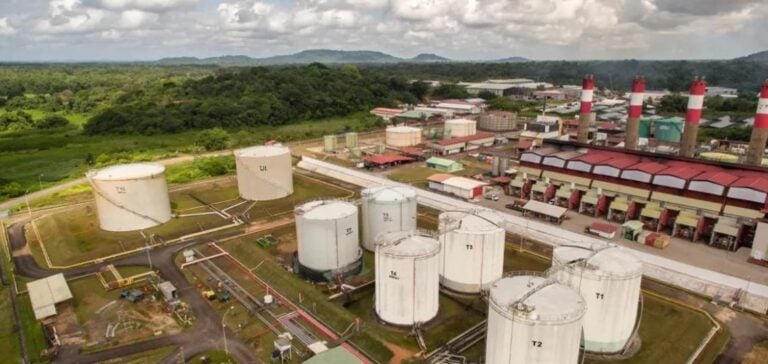The French Inspectorate General of Finance (IGF) has recommended that Société anonyme de la raffinerie des Antilles (Sara) cease its refining activities in overseas France.
The report, commissioned by the government in 2022 and recently published, highlights the impact of refining costs on fuel prices in Guadeloupe, Martinique and French Guiana, where Sara operates as a monopoly.
According to the IGF, refining costs increase pump prices by around 13 euro cents per liter for premium fuel and 7 cents for diesel compared with mainland France, despite lower local taxes.
Reducing prices through direct imports
The IGF report proposes an overhaul of the current model, recommending the cessation of refining in favor of exclusive importation of finished petroleum products.
Such a measure could reduce the price of unleaded petrol by 14 to 18 centimes per liter, according to IGF calculations.
In return, the IGF suggests maintaining Sara’s monopoly on imports, in order to guarantee a degree of market stability and avoid unpredictable fluctuations.
However, this proposal could raise concerns about the transparency and regulation of such a monopoly.
Sara has reacted strongly to these recommendations, describing them as out of touch with local economic reality.
In a press release, the company warned of major social consequences, particularly in terms of the loss of skilled jobs in the areas concerned.
The debate surrounding this proposal highlights the tensions between the objectives of reducing costs for consumers and preserving a local industrial base.
Transparency and regulation of the fuel market
The IGF also points the finger at the complexity of fuel pricing mechanisms.
At present, prices are regulated by prefectoral decree, but this method lacks clarity for consumers and market players alike.
The report proposes transferring the supervision of price-setting mechanisms from the administration to the Commission de Régulation de l’Energie (CRE).
This would improve transparency and understanding of the criteria used to determine prices, without changing the fundamental regulatory structures.
The report also raises the issue of balancing the profitability requirements of companies operating in monopoly situations with the need to guarantee competitive prices for consumers.
It invites reflection on ways to ensure more effective, less opaque regulation of the energy sector in the French overseas territories.
Outlook for the energy sector in Overseas France
The IGF’s recommendations, if implemented, could transform the fuel market in overseas France, breaking with decades of local refining.
Eliminating refining could bring lower costs, but it also carries risks of increased import dependency and impact on local employment.
The transition to a model based exclusively on imports would require an overhaul of existing infrastructures and careful management of the economic and social implications.
The debates surrounding these recommendations highlight the need to rethink energy and economic policies in these territories.
Decision-makers will have to strike a balance between the imperatives of competitiveness, market transparency and the preservation of local employment, while taking into account the geographical and economic specificities of the regions concerned.





















